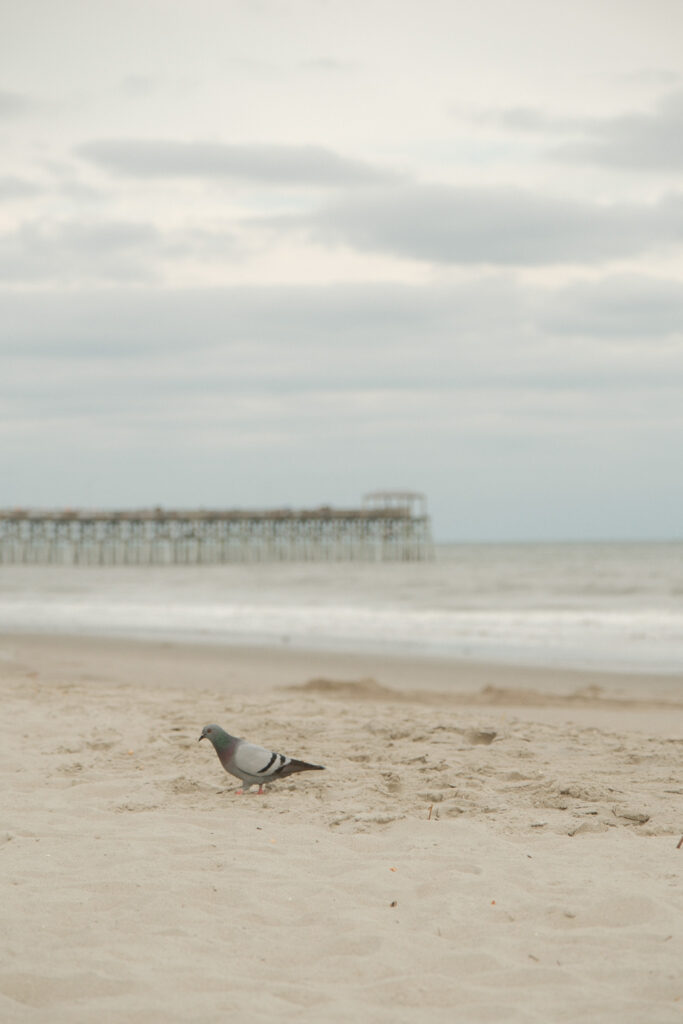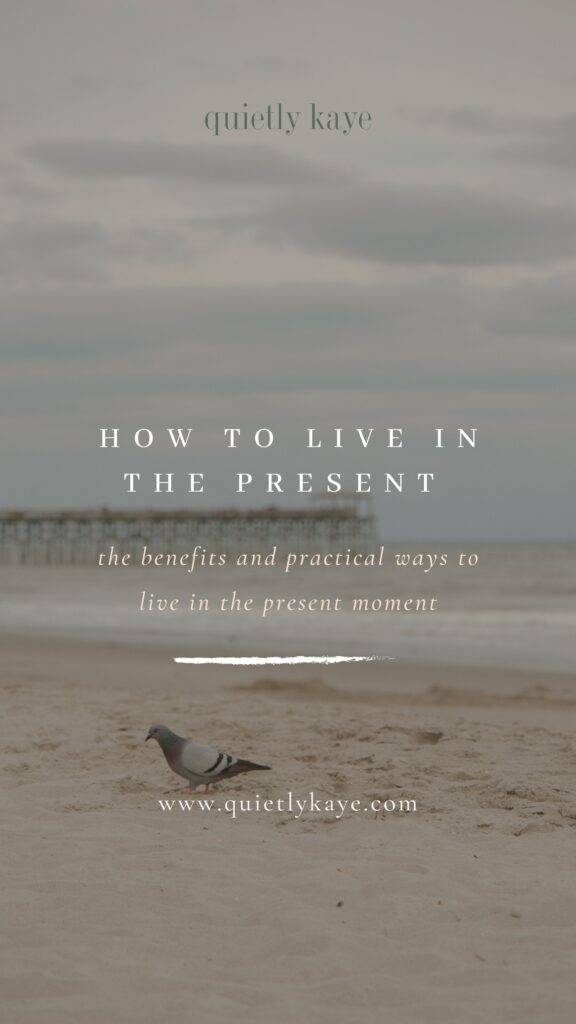
I used to not know what “living in the present moment” meant.
If you asked me in my early 20s, I would have been like, “Which present? You mean the present moment where I am worried about my bills? How frustrated I am with my dating life? How unfulfilled I am in this job?
Because I can assure you my present life is one I wish to escape from.”
I didn’t realize it then but much of my life I either dwelled heavily on the past [rehashing old conversations, holding on to grudges, wish-i-coulds, you name it], or daydreamed about the future.
Very rarely did I spend time in the present, because more often than not I did not like it there.
Even though since a young age I learned to always be grateful for what I had and where I was in life, I realized that I always wished my life was more this or that.
That’s why it was hard for me to grasp the concept of living in the present moment.
Years of working on myself has changed this though.
While I am still a work in progress, I’ve learned a few simple tricks to live in the present. I hope this helps you too!
Before we get into the how, here are a few benefits of why living in the present is good for us:
1. Reduces stress and anxiety
Focusing on the present helps reduce worries about the future or regrets from the past. When you are in the “now”, your mind has less space for the “what-ifs” and more room for calm.
2. Improves mental and emotional health
Being present helps you think more clearly and make better decisions instead of acting on autopilot. It also allows you to become more aware of your emotions without being controlled by them.
3. Strengthens relationships
When you’re truly present with others, people feel that energy. When others feel seen by you, it builds stronger and deeper connections. This applies to both personal and professional relationships.
4. Boosts creativity and flow
When you are in the present, you are not bogged down by the past or the future, which helps you loosen up. A clutter-free mind helps ideas flow easily.
Think of those movies where a writer goes off the grid to get unblocked, and after spending time in solitude comes out with their best work! It’s because they become “in the zone”, which is what being present really feels like.
5. Promotes inner peace
When you regularly clear your mind of noise, peace naturally follows. It’s easier to navigate a chaotic world when you can tap into your inner peace, and to achieve inner peace you must often practice being present.
Now that we’ve laid out the benefits, let’s get into a few practices on how we can live more in the present:

1. Yoga/Meditation
Yoga was actually the very first practice that taught me to be present.
[PS I wrote about how doing yoga changed my life here]
Focusing on the body is a quick and easy way to bring yourself to the present moment.
YouTube has a lot of free yoga sessions you can follow along, ranging from 10 minutes to full 45 minutes to an hour. You can find ones that match your level.
If you have never done yoga before or simply don’t feel like getting up and striking a pose, meditation is another great way to be in the present. It is quite literally the whole point of meditation.
Body scanning is a great place to start with meditation!
You can do this whether sitting down or lying down in your bed. Just close your eyes, and imagine “scanning” each part of your body, beginning from the top of the head, moving down all the way to the bottom of your feet.
I find this easier to do when I listen to guided body scan meditations. You can find a ton on YouTube. I use this often for help falling asleep.
Breath work is probably the easiest and most instant way to meditate and to be in the present. I think breathing is something we easily take for granted because we don’t even think about it, we just involuntarily do it!
But once you notice your breath, you are immediately brought to the now. I do this throughout the day whenever I start to feel overwhelmed.
Close your eyes, and focus on your breathing. Notice the rise and fall of your chest. You can start breathing more deeply too for instant relaxation.
I like to do “box breathing” where you breathe in for four seconds, hold it at the top for four, exhale for four, and hold at the bottom for another four. Repeat as many times as you need.
If your mind starts to wander [which it will], don’t judge your thoughts.
Gently bring your awareness back to your breath while imagining your thoughts as mere clouds passing by.
By being aware of your body, its sensations, and releasing tension by breathing deeply, you are bringing yourself to the present moment, leaving no space for thoughts that worry you.
2. Gratitude practice
Another great way to live in the present moment is by practicing gratitude.
I’m sure you’ve heard of the gratitude journaling practice where you write down 3 things you are grateful for either in the morning or before bed.
I’ve tried this on and off during the years, because it’s hard to commit to journaling every day [I prefer to pick up my journal whenever I really feel like it, not because I have to].
So a quick way to still get my gratitude practice in [if I’m not feeling like pulling out my journal] is when I wake up, I just think of 3 things I am grateful for, on the spot.
That’s it. Instead of waking up already feeling dreadful for the day ahead or my long to-do lists, I take immediate control of my mind by thinking of things I am grateful for.
Feeling gratitude is the easiest way to raise your vibration so that you align with the frequency of your desires and attract them quickly.
I know I know- you might think this all sounds “woo woo”, but this is all backed by quantum physics [I recently got really into this stuff and it’s fascinating- we can talk more about this in later blogs!].
But anyway, gratitude brings you to the present moment and allows you to be more appreciative of the here and now.
3. Disconnecting from your phone regularly
These days there is no quicker way to get lost in “la la land” than being glued to our devices.
Social media deliberately targets us to stay on their app as long as possible by throwing every videos and graphics and photos and products at us that they think we’d like to see.
Even worse, they show you news they know will rile you up, and next thing you know your mood has gone sour, you’re agitated, and now your day is ruined and you don’t even realize why.
How many times have you opened Instagram and watched one reel, and next thing you know you’ve been watching videos after videos for 30 minutes straight? Yeah, me too.
When you put the phone down or designate “tech-free” moments in your day, you become more present not only for yourself, but also for the people around you.
Giving someone your undivided attention makes them feel valued, seen, and respected, creating deeper connections.
4. Doing daily tasks slowly and intentionally
We are living in such a hurried pace that we forget to stop and appreciate where we are and what we have.
Have you ever gone somewhere and you get there and wonder how you got there?
Maybe you were so lost in your head or it’s become a boring routine that you didn’t even notice yourself getting in the car and driving there. I’m guilty of that too.
Whenever I realize that I am moving too fast, I simply pause, and look around me.
I try to use all my senses to take note of my surroundings. What do I see in front of me, what am I holding and how does it feel, what scents are around that I can smell, are there any music playing or people having conversations?
Also limit multitasking. Try to do things one at a time. This is hard to always follow [I am an avid multitasker!] but just do your best when you can!
Romanticize the mundane things you do on the daily.
5. Keeping a journal
Like I mentioned above, I don’t write in my journal every single day. It’s just not always possible.
But when and if you have the opportunity, I recommend journaling in the morning what you’re grateful for and then set your intentions for the day.
If you are feeling up for it, you can even journal in the evening as well to reflect on what went well and what lessons you may have learned.
There are days where I can journal twice sometimes multiple times a day, and other days only once in the morning or evening, or not at all.
Journaling doesn’t have to be handwritten either by the way.
I have a few different journals all over the place haha. Sometimes I write on my Notes app on my phone, sometimes I open up a Google doc and full on write an essay, or even just record myself talking on my voice notes like I am on my own podcast!
However you can get words out, do that.
Journaling is a great way to live in the present, because it allows you to identify emotions you are currently experiencing.
***
There are so many other ways to practice being present, these are just some of the practical ones I do myself that I’ve found useful.
Did any of these help? Do you have any other recommendations? I’d love to have a conversation in the comments.